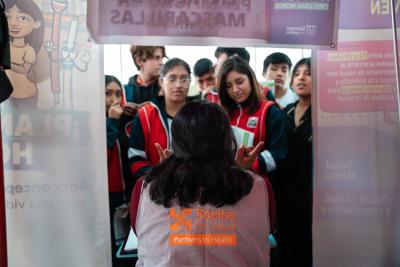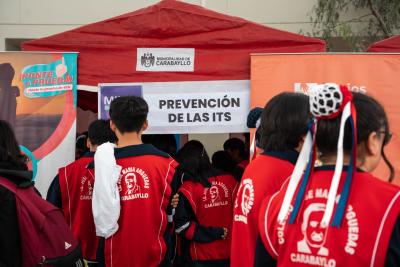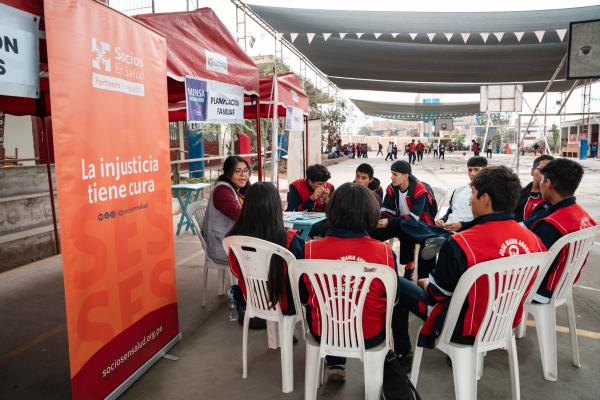The World AIDS Day, commemorated every December 1, is a key moment to reflect on the challenges faced by people living with HIV and the opportunities to improve their quality of life. Among the most vulnerable groups is the adolescent population, who not only face age-related changes and the challenge of the transition to adulthood, but also the stigma associated with their diagnosis and systemic barriers to accessing comprehensive care.
In Peru, the outlook is worrisome. According to the National Center for Epidemiology, Prevention and Disease Control of the Ministry of Health (MINSA), in 2023, 773 new HIV diagnoses were registered in adolescents and young people aged 10 to 19 years. This figure reflects the urgency of implementing initiatives that not only guarantee access to treatment, but also provide emotional and educational support to this population.
With this in mind, Socios En Salud, through its HIV and Sexually Transmitted Infections and Mental Health programs, has developed targeted projects for adolescents living with HIV. These are initiatives that address the gap in access to services, as well as stigma, to promote self-care and continuity of treatment.

A través de la sensibilización, Socios En Salud busca romper el estigma en torno el VIH entre la población adolescente.
Foto de SES
A chatbot for adolescents with HIV
With funding from the Collaborative Initiative for Pediatric HIV Education and Research (CIPHER), the Mental Health Program of Socios En Salud developed EVA, a specialized chatbot that seeks to educate about depression, provide self-help strategies and facilitate linking adolescents living with HIV with specialists when necessary.
In a pilot test conducted with 50 participants aged 10 to 19, EVA achieved 96% acceptance. Youth highlighted its usefulness as an educational tool, its ease of use and its ability to address emotional problems confidentially and safely.
The results of this tool attest to its ability to offer immediate support. Through a personalized approach tailored to local needs, the project aims to help overcome the stigma associated with seeking mental health help.
In addition, preliminary results have been shared in international conferences and scientific publications, highlighting its relevance as an innovative model that could be replicated in other countries.
The project also explores how to integrate technological tools such as EVA into broader health systems, with the goal of creating a sustainable and scalable approach that will benefit more adolescents in the future.
In a pilot test conducted with 50 participants aged 10 to 19, the EVA chatbot developed by the Mental Health Program’s CIPHER project achieved 96% uptake.
PASEO: beyond medical treatment
The PASEO project, from the HIV and STI Program of Socios En Salud, addresses another fundamental aspect: adherence to treatment, i.e., adequate and consistent compliance with a prescribed medical regimen. Funded by the U.S. Institutes of Health, PASEO is a randomized clinical trial that seeks to determine whether a comprehensive intervention that includes emotional, educational and social accompaniment significantly improves treatment adherence in adolescents and young people ages 14 to 24 living with HIV.
With 160 participants divided into two groups, PASEO compares the outcomes of those who receive routine care in the public system and those who, in addition, receive this personalized intervention. Currently, 80 adolescents from 4 hospitals and 6 health centers of the Ministry of Health are receiving this accompaniment, and preliminary results will be available in a year.
“The importance of this project lies in demonstrating that the combination of medical care and expanded and differentiated support for this population can make a significant difference in the lives of adolescents and young people with HIV, and serve as a model to be scaled locally or even replicated in other contexts,” comments Renato Errea, head of the HIV and STI Program of Socios En Salud.

Hablar sobre prevención de VIH en adolescentes es clave para educar, reducir riesgos y construir un futuro más saludable.
Foto de SES
DiME: social networks against stigma
Stigma remains one of the main barriers to the inclusion and well-being of people living with HIV. The DiME project, funded by the U.S. Mental Health Institute and implemented by the HIV and STI Program, leverages the reach and influence of social networks, such as TikTok and Instagram, to combat both external stigma and HIV-related self-stigma
The content, developed after focus group analysis and interviews with more than 113 participants including adolescents and young adults ages 16-29 living with HIV, addresses key issues suggested by this population and is disseminated with the support of a marketing agency and with the involvement of influencers . Although the impact of the project is still being measured, initial results are encouraging: the TikTok account has surpassed 10,000 followers, reflecting a high level of interest and participation.
DiME underscores how digital platforms can be a powerful tool for educating and transforming perceptions, empowering young people with HIV and promoting a more inclusive society.
Thus, through these three initiatives, Socios En Salud reaffirms its commitment to adolescents living with HIV, highlighting the importance of innovation, accompaniment and education to build a more equitable future full of opportunities.
Your donation makes a difference. Contribute and help us bring the cure against social injustice to more communities.
